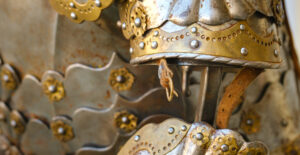
In the low, early morning light of Johannesburg’s taxi ranks, silence is a temporary currency. The idling engines, the murmured goodbyes, the heavy hands exchanging plastic bags stuffed with home. There is one moment, always the same, always wordless, when a small item is pressed into a hand. Not a suitcase. Not a wallet. Not a passport. A gold chain. A ring. A bangle. Sometimes bought. Sometimes inherited. But always given. This is not jewellery. This is a contract.
Across Southern Africa, migrant workers have kept entire economies alive, on construction sites, in mines, on farms, in city homes they don’t own and won’t ever live in. But behind every wire transfer, behind every child’s school fees paid from a thousand kilometres away, there’s a ritual that has mostly gone unnoticed, the act of gifting gold to the departing.
They call it farewell gold in some circles. Imali yehambo. Not because it’s meant to be sold, but because it travels. It’s the weight you carry when you leave everything else behind. The practice isn’t new. It has echoes in the 1800s, when men left rural Transkei to dig gold out of Johannesburg’s belly. Their families, unable to follow, would send them off with small items of personal value, buttons, beads, sometimes twisted bits of copper wire shaped like home. Over time, as mining profits soared and jewellery stores crept closer to the townships, those farewell tokens became gold.
But this gold wasn’t for show. It was insurance in the truest sense. Not the kind you sign for. The kind you give because you might not see someone again. At a bus stop in Butterworth, a woman named Noluntu sells grilled mealies under a rusted zinc roof. She’s handed out five gold items in her lifetime, one to a brother, two to sons, and two to lovers. “Only two came back with them,” she says, unwrapping a small, dented bracelet from a cloth. “The rest? They came back without the people.”
The bracelet is thin, almost threadbare, but it has initials on it. It belonged to her youngest, who died in an accident on a farm in the Western Cape. She received it back in a shoe box, along with R200 and a note from a coworker, “He never took it off.” In some communities, the gifting of gold is done at farewell parties. A small chain tucked into a jacket pocket. A ring slipped on a finger with more pressure than ceremony. And then the bus door closes. The distance begins. Gold, in this context, is less about value and more about visibility. When you wear it, you are known to someone. It says, I belong somewhere. I am missed. If I vanish, someone will ask why.
The mines, ironically, became both the reason for departure and the end point for much of this gold. Workers who dug gold by day wore slivers of it around their necks by night, gifts from home. It became a quiet rebellion. To take the metal pulled from your sweat and wear it not as reward, but as reminder, I’m not from here. I’m not staying.
But even outside of mining, the tradition persists. In Durban, domestic workers from Lesotho and Malawi tell stories of “mother gold”, the pieces handed down from matriarchs who watched their daughters leave for cities they couldn’t pronounce. “She said, don’t sell it unless you have to,” one woman recalls. “But if you do, make sure it buys you freedom.”
In a small shop in Yeoville, there’s a pawnbroker named Tim who keeps a drawer marked “Returns.” It’s where he stores gold items that have too much story on them to melt. “I’ve got bangles with birth dates, lockets with ashes, rings that were worn down like butter,” he says. “Sometimes the owners never come back. Sometimes the families do. I don’t sell those. I wait.”
One of the most common farewell gifts is a plain gold band with no markings. It looks like a wedding ring, but it’s not. It’s a placeholder. A token. A reminder that someone, somewhere, is waiting for the wearer to return whole. These rings appear on the fingers of security guards, taxi drivers, seasonal labourers. They’re scratched, reshaped, sometimes replaced, but never removed.
 What’s most haunting, perhaps, is how often these gold gifts are found on bodies. In the aftermath of bus crashes, farm accidents, and even mine collapses, it’s not an ID or pay slip that identifies the deceased. It’s the gold around their neck. The bracelet their daughter gave them. The ring from a sister. The tiny pendant from a wife. It becomes a strange kind of passport. A final declaration, I mattered to someone.
What’s most haunting, perhaps, is how often these gold gifts are found on bodies. In the aftermath of bus crashes, farm accidents, and even mine collapses, it’s not an ID or pay slip that identifies the deceased. It’s the gold around their neck. The bracelet their daughter gave them. The ring from a sister. The tiny pendant from a wife. It becomes a strange kind of passport. A final declaration, I mattered to someone.
But there’s also joy in the ritual. When migrant workers do return, especially during holidays, the gold is polished, paraded, shown off like survival itself. It sparkles under the gaze of families who feared it might come back without them. Children are lifted up and allowed to touch the chain. It becomes mythic. It becomes proof.
In recent years, there’s been a new twist to the tradition. Younger workers are turning to custom engravings, adding GPS coordinates of their villages, names of parents, even small lines of poetry. A popular piece in Cape Town reads, “No road swallows me.” Another simply says, “Mama’s boy.” These aren’t flashy additions, they’re intimate. Anchors.
One workshop in Gqeberha has begun offering gold tags in the shape of small suitcases, etched with departure dates. The idea? That when you return, you scratch the date of arrival onto the back. It’s quietly beautiful. And, like everything about farewell gold, filled with both hope and caution. There’s criticism too. Some argue that gold shouldn’t be placed on workers who already carry too much burden. That it puts a price tag on love. But that misses the point. This isn’t about worth. It’s about witness. About saying, I see you. Go well. Come back.
In a country where labour is exported like grain and returned like ghosts, these tokens matter. They hold space. They hold memory. They hold the names of those who left and those who never could.
And in that small, gleaming way, gold once again becomes what it has always been in South Africa, not just a metal, but a message. One that doesn’t fade. One that carries. One that waits.
So the next time you see a man board a bus with only a backpack and a gold chain under his shirt, know this, he’s not alone. He’s wearing home.



